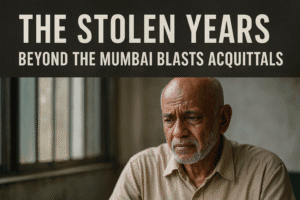The Stolen Years: Beyond the Mumbai Blasts Acquittals
The Bombay High Court’s acquittal of 12 men in the 2006 Mumbai train blasts case marks a staggering failure of India’s justice system. After 17 years of wrongful conviction, the court cited lack of evidence and serious investigative lapses, exposing a manufactured appearance of justice.
For the acquitted, it’s not just freedom regained, but decades lost—family, identity, and dignity stolen by the very system meant to protect them. Meanwhile, families of the 189 victims face renewed grief, justice denied yet again. This case underscores a systemic rot, where flawed investigations can ruin lives and let real perpetrators walk free.
It’s a chilling reminder of how easily justice can be derailed. Now begins the true reckoning: rebuilding lives, restoring trust, and reforming a system that allowed such a catastrophic injustice to unfold. The stolen years can’t be returned, but the lessons must not be ignored.

The Stolen Years: Beyond the Mumbai Blasts Acquittals
The Bombay High Court’s acquittal of all 12 men accused in the horrific 2006 Mumbai train blasts wasn’t merely a legal reversal. It was the shattering end to a two-decade-long nightmare – a stark indictment of a justice system that failed catastrophically, twice over.
The facts alone are staggering: 189 lives extinguished, over 800 injured in coordinated terror attacks. Seventeen years after their convictions, a special bench eviscerated the prosecution’s case, citing utter failure to prove guilt and scathing “lapses in the investigation.” The court’s damning observation – that authorities created a “false appearance of having solved a case” – resonates far beyond this courtroom. It speaks to a profound betrayal of public trust.
The Human Cost of Failure:
- For the Acquitted: Imagine being arrested when your daughter is six months old, branded a mass murderer, and finally emerging, exonerated, as she enters college. Twenty years. Two decades of life – fatherhood, career, identity, the simple rhythm of existence – stolen not by terrorists, but by the state entrusted with protecting you. Their ordeal mirrors Kafka’s Josef K., trapped in an incomprehensible bureaucratic nightmare, accused of an unknown crime. Yet, their release isn’t an ending. The label “terrorist,” however unjustly applied, clings like tar. Rebuilding a life, navigating a world transformed, carrying the invisible scars of dehumanization – this is their new, daunting reality. The state inflicted the wound; society bears the burden of their reintegration.
- For the Victims’ Families: While the acquitted grapple with stolen time, the families of the 189 dead face a different, agonizing void. Their quest for justice and closure has been brutally reset. The perpetrators remain free. The conviction they might have clung to as a form of reckoning has been annulled, replaced by the bitter taste of institutional failure. Their grief is compounded by the knowledge that the system promised accountability but delivered only a cruel illusion.
Beyond the Headlines: A Systemic Malady:
This case, under intense scrutiny, exposes terrifying vulnerabilities. If this investigation, with its high profile and public pressure, could result in such a profound miscarriage of justice, what horrors lurk in the shadows of less visible cases? The chilling implication is that countless individuals may be languishing in prisons, victims not of crime, but of incompetence, haste, or worse.
Echoes in Our Collective Consciousness:
This tragedy resonates because it taps into universal fears. Like Andy Dufresne in The Shawshank Redemption, these men faced an abyss not of their making. Their survival, like his, required a desperate, almost superhuman, resilience. The iconic line – “Get busy living or get busy dying” – takes on grim poignancy here. For twenty years, they were denied the choice. Now, their struggle to truly live begins.
Not Closure, But a Reckoning:
The acquittals are not the end. They are a devastating new chapter:
- For the Exonerated: Their fight is for restoration – of dignity, opportunity, and a life beyond the shadow of false accusation. Society owes them more than freedom; it owes active support and the space to heal.
- For the Victims’ Families: Their demand for true justice remains urgent and unanswered. The search for the actual perpetrators must be reinvigorated with transparency and competence.
- For the System: This is a five-alarm fire. It demands rigorous, independent investigation into the investigative failures, accountability for those responsible, and systemic reforms – from evidence handling to witness protection to forensic capabilities – to prevent such catastrophic errors. The court’s condemnation of creating a “false appearance” of resolution must become a mantra for reform.
The Mumbai train blast acquittals are not merely the “end of an error.” They are a searing reminder of justice delayed, justice denied, and lives irrevocably shattered by the very institutions meant to safeguard them. True resolution lies not in this verdict, but in the arduous, necessary work of ensuring such profound failures never happen again. The stolen years cannot be returned, but the systems that stole them must be rebuilt.
You must be logged in to post a comment.